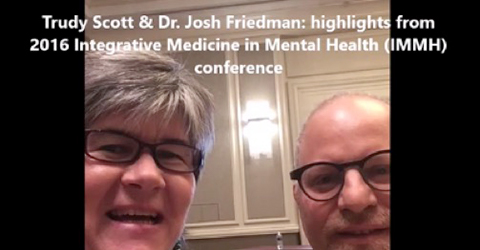
Here are some highlights from the recent Integrative Medicine for Mental Health conference. We did it live on Facebook, holding my iphone, as the conference was ending. I’m with my colleague Dr. Josh Friedman and this is the video and transcript of our discussion – we cover the following:
- Methygenetic Testing to fine tune your gene results
- Low dose lithium for irritability and alcoholism
- Kundalini yoga if you have a hard time meditating
- Coffee enemas for medication detox
- Working as a detective to find your root cause
- Simple changes like adding GABA or 5-HTP or removing gluten and/or dairy
Ok we are live… Trudy Scott, certified nutritionist and author of The Antianxiety Food Solution and Dr. Josh Friedman, a psychologist interested in integrative medicine approaches to depression.
Josh: I have a new website integrativedepressionsolutions.com and we are at the IMMH conference and it has just wrapped up – there was a huge amount of information, tons to learn, it was wonderful. What were your take aways Trudy?
Trudy: One of the things that I thought was absolutely fascinating was this booth called Methyl Genetic Testing. You can enter your 23andme data and then what you can also do is – while they are running their analysis on that – enter blood work, enter results of organic acid tests and results of stool. They actually show you if your genes are expressing and causing problems. Because you may have a MTHFR methylation genetic defect showing up on your SNP but maybe it is not causing you a problem. So this way you can actually determine if it is causing you a problem. You had shared with me that you have done the training?

Josh: The training was really amazing. Functional medicine looks at how the biochemical pathways of the body are working. This provides you with another layer – which is how are the genes that are programming those enzymes support those pathways – and it can provide you with an awful lot of information. And then they have a very simple program you plug your genes into and it gives you a guide as to what kind of supplements might help.
Trudy: Amazing! So it is really fine tuning the functional medicine and fine tuning what might actually be going on with each individual.
Josh: It gives you the next amount of information because the functional medicine actually shows you what is happening whereas the genetic testing shows you what potentiality there might be. So you might have a folic acid defect or your folate could be fine – so that was pretty interesting.
Trudy: What else did you like?
Josh: I went to a lecture on the use of low dose lithium for all kinds of things. It is something that I’ve known about – obviously pharmaceutical use [of lithium] for bipolar disorder. Low dose lithium can also be used for bipolar disorder, but the two things new I learnt is that it is incredibly helpful for irritability. So I am dealing with [clients with] depression and it is something that I have often not thought about for irritability. It is also helpful for situations if you have a parent or family history or a past history of substance abuse or alcoholism. So that was something that I’ll take home to my office.
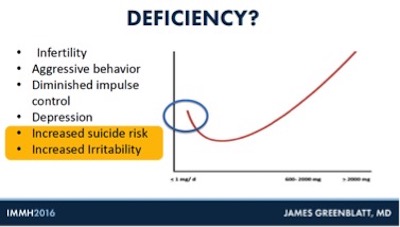
Trudy: And it is something that I currently use in my practice and [I learned it from] Dr. James Greenblatt. He actually presented on a similar topic last year and I heard it then. So low dose lithium is the lithium orotate, we want to be clear about that – 5 to 10 mg twice a day is kind of what we are thinking about. I’ve had great results with women with insomnia. It helps to stabilize the mood and when you are using the amino acids you need a stable mood – you can’t have these ups and downs – so the low dose lithium is really good for that. I would like to hear how it goes when you are using it.
Josh: I have used it with some people with a history of alcoholism and it has provided stability in their mood which is really good. What else have you got?
Trudy: I loved Dr. Kelly Brogan, we always love her, don’t we? She is just really fabulous. She talked about the issues with all the medication and how she does not prescribe anymore. And she talked about a good Paleo diet and getting off gluten and all that good stuff. New things that I heard from her was how she loves Kundalini yoga and how she loves it because she can’t meditate. I find a lot of my clients have a problem with meditating so I always say if that does not work find something that is going to work. And she has found that this Kundalini yoga works for her. So tell me a little about what you know about it?
Josh: I think Kundalini yoga is quick movements with very quick breathing so it easily occupies the mind. So for someone who would have a hard time sitting and meditating that kind of movement would be helpful. Other kinds of movements and other types of yoga are Tai Chi or qigong. Movement or walking meditation can be easier practices for stress management if sitting completely still is hard.
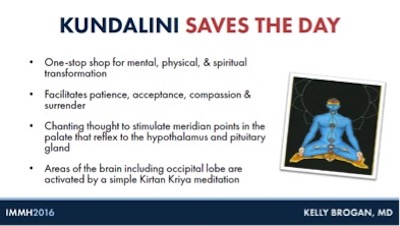
Trudy: So we are doing Facebook live here for those of you who are just joining now. We are at Integrative Medicine for Mental Health conference and it is Trudy Scott and Josh Friedman.
And I want to pass the phone to Josh to hold because my arm is sore and killing me. Maybe he will do a better job than me.
The other thing that I heard from Kelly Brogan that I really enjoyed is that she is using coffee enemas. I have quite a lot of experience with them because the first practitioner that I worked with when I was an intern used coffee enemas for detox for cancer and had really good results. Dr. Brogan was saying how effective it is for phase 1 and phase 2 detox. It also helps with bile production and the part that I really like is that it helps with medication detox. So this is something that I’m going to be looking into a little bit more and I’ll come back and share more as I learn more.
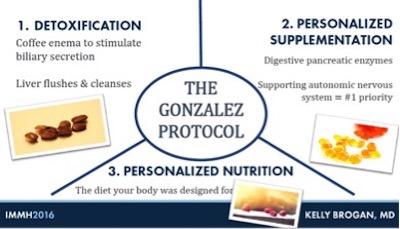
Josh: That’s pretty cool. One take away I had is that functional medicine can often be like a very complex process of delving into the root underlying cause of symptoms – so things like detox pathways or different kinds of infections. Trudy here gave a talk – and her talk was on amino acids and dietary change and blood sugar stabilization and stress management. One of the things I heard running through the entire workshop was sometimes it is simple things that can make a huge difference. And so with using amino acids for mood issues it can be incredibly quick.
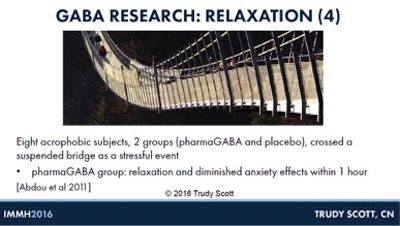
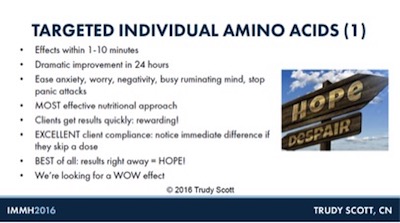
I don’t remember what her name was, but there was a psychiatrist who presented at the end, she talked about how she got into functional medicine and she was talking about the radical changes she had in her health status from simple dietary changes. So stopping gluten and dairy was a huge change for her.
Trudy: That’s important. We want to realize that these dietary changes and nutrients can have profound effects. I was talking to Dr. Nicole Beurkens earlier [about zinc and GABA for anxiety] and saying a lot of my clients will say “my anxiety and my depression is so severe I have to have medication, there is no way that diet and nutrients can make a difference”. But they really can. It can completely transform your life. I remember you shared a story of someone who got off gluten?
Josh: Yes, I see those powerful changes every day – where someone with a dietary change or a supplement like 5-HTP or GABA just changes everything. It is the one change that might move things along. It is quite amazing.
Trudy: And it is just a matter of finding what that root cause is for your anxiety and your depression – it may be low serotonin, and it may be gluten or you might need lithium support, it may be that you have an infection. We have heard about Clostridia this weekend, we’ve heard about Toxoplasma gondii, we’ve heard about Lyme disease – they can manifest in many different ways, [including anxiety and depression] – so finding that root cause is important.
Josh: So what people were talking about was being a clinical detective. So working collaboratively with your clients and just saying “it is going to be a process, we will find a solution, but it is going to take some time to figure it out.” Then there is a lot of detective work that can be done with pencil and paper: measures, asking questions, a clinical interview and it is putting the person’s story together to get to the bottom of what is going on. And so sometimes we can do that without testing. There are a lot of clinicians here, there are doctors here but neither of us are physicians and a lot of the work we both do is working with clients to try to figure out what that missing piece is.
And so, sometimes the missing piece can be quite small. I had a patient who had debilitating depression, had been hospitalized three or four times and we did one test, and the test was an IgG food allergy test. He was a weight lifter and he was doing 5 whey protein shakes a day, and it came up that he was severely allergic to dairy. He stopped dairy and within two days his mood was back to normal. I spoke to him recently and he has been stable and happy since his mood lifted.
What a wonderful outcome for his client!
And what an excellent conference! This is part 1 of our discussion. Stay tuned for part 2.
Feel free to post questions or comments below. And let us know if any of the above resonate with you?
Lithium Orotate saved my life. I was at the point of being hospitalized due to agitation,depression and anxiety. In desperation, my husband started doing internet research and asked me if I was willing to give it a try. Within 24 hours, I started to calm down. I still take it whenever I get overwhelmed with grief, as I lost my darling a year ago. It acts immediately. I just let it melt under my tongue. I wouldn’t say it “cures” anything, but it sure helps A LOT and RIGHT NOW. I also rotate 5HTP, GABA, and a serotonin/dopamine homeopathic liquid preparation to keep the depression at bay. I have lifelong depression, and have yet to find the right mix of diet and nutritional support to make it go away permanently, but everything helps a bit.
Jennifer
Thanks for sharing – this is wonderful to hear. I see similar results with many of my clients. May I ask how much helps you? 5-10mg twice a day seems to be a good dose for most. Keep looking for your solution and consider a trial of tryptophan (many people do better on this instead of 5-HTP) and tyrosine (the latter if you have the low motivation curl-up-in-bed depression) and DPA/Endorphigen (for the grief and emotional feelings/weepiness).
I assume you are gluten-free, sugar-free, caffeine-free, eating to control blood sugar, addressing gut health and specific nutritional deficiencies like low zinc, D, B12, B6 etc
I have epilepsy and I am having difficulty tolerating drugs but have recevtly fallen and I am afraid to get off of them. but want to so badly. Yoga and meditation help. Is there something I can do to get off drugs completely as they mess with my body bigtime-I take-keppra, zonegran; Doctor wants me to take , aptiom (I looked this drug up on dollars for doc. and they pay epileptologists big to promote their product. I am hesitant ro take this one because of it.
Mary Jane
It would be best to find a functional medicine doctor to work with – someone who is familiar with these meds, the use of GABA and taurine for seizures and the ketogenic diet for seizures.
can I ask what serotonin/dopamine preparation you use Jennifer?
My 22 year old son with autism can’t tolerate GABA or 5 HTP-it gives him mood swings so I’m interested in the homeopathic you are using.
THanks
I use Serotonin Dopamine Liquescence from Professional Formulas. I have been muscle tested by my naturopath Dr. Parsons and confirmed that I need it. Obviously homeopathic preparations don’t have the same effect for everyone, but this one was a game changer for me.
Jennifer
I had somehow missed that you said you “also rotate 5HTP, GABA, and a serotonin/dopamine homeopathic liquid preparation to keep the depression at bay.”
The Serotonin Dopamine Liquescence from Professional Formulas is new to me and I’d love to hear how you rotate this with the 5-HTP and GABA and the benefits you see?
Kundalini is an occultic practice. I have plenty of experience in this area. It is nothing to “mess around” with.
Jean
This is new to me other than a previous blog comment from someone saying something similar about all yoga. I have not seen anything in the literature to about this and would appreciate you sharing more from your experience.
In the meantime here are some studies supporting it’s effectiveness in mental health:
A Yoga Intervention for Posttraumatic Stress: A Preliminary Randomized Control Trial: “Both groups demonstrated changes in PTSD symptomology but yoga participants showed greater changes in measures of sleep, positive affect, perceived stress, anxiety, stress, and resilience” https://www.ncbi.nlm.nih.gov/pubmed/26366179
Yoga-enhanced cognitive behavioural therapy (Y-CBT) for anxiety management: a pilot study. “Yoga-enhanced cognitive behavioural therapy (Y-CBT) may be a promising new treatment for those suffering from generalized anxiety disorder. Y-CBT may also reduce depression in those suffering from generalized anxiety. Y-CBT may reduce depression and anxiety in a clinic population where clients suffer from multiple diagnoses including generalized anxiety disorder.” https://www.ncbi.nlm.nih.gov/pubmed/24804619
I personally see amazing benefits from yoga (my favorite is Iyengar) and so do many of my clients. I have yet to experience Kundalini yoga.
Jean, I agree!!!
I have heard also from people who do kundalini yoga they get supernatural powers like to see through walls etc. so I didn’t want to try it!
Roxy
This is news to me! I would want to know what else they are doing in the way of hallucinogenic drugs!
But since a few people have voiced concerns I did a quick google search and found this https://www.reddit.com/r/yoga/comments/2ix6yz/opinions_on_kundalini_yoga/ I’m not saying it’s a reliable source but some people are voicing that they don’t like it and it feels weird.
I chose to be curious and include it in this blog because I highly respect the work of Dr. Kelly Brogan. Personally I love Iyengar yoga and I get that not everything is for everyone.
Trudy I just started trying Theanine and I want to combine it with Gaba and Tryptophan since 5htp doesnt seem to help or maybe I just need to take more because 50 mg doesnt feel a change anyways and I am also curious about Lithiam Orotate. How far apart should I take each and what order is your best opinion for your clients?? Thank you! On the other note I know Dr Kelley recommends Kundalini and is a fan but maybe its not for everyone!!
I’ve just discovered your website and can not read quickly enough – so much good information. I found your site when I was looking for information on taking 5-htp and whether it should be combined with GABA.
I’ve had issues with not sleeping for about 10 years, since I was in pre-menopause. I took temazepam for about a year until my doctor said I should not take it long term and I started taking Ambien. Both were great and I slept but often had that morning after dopey feeling. Obviously neither of those are good long term and the cost of Ambien is no longer covered under most medical plans. I’ve not really come up with a good solution. Melatonin gives me nightmares. I’ve tried several OTC remedies with little success. Within the past year a holistic practitioner recommended Prolent which takes a few days to be effective but it does work to sort of reset the body clock but, like many other people have commented, I still get that 2 am or 4 am wake up problem and have difficulty falling back to sleep.
Just this week I started taking 5-htp. The first night I did not take enough and was awake almost all night. Last night I adjusted the amount and slept pretty well, I woke a few times but was able to go back to sleep. After researching 5-htp, GABA and tryptophan I think I see that these can all be taken individually or the 5-htp with GABA or the tryptophan with GABA. At this point I am going to stick with the 5-htp at the amount I’m taking to see how that works.
Is there a downside to take 5-htp, either alone or with the GABA long term? Other than HRT I do not take any other medications.
I’d like to get off of HRT with something natural and am working with a local nutritionist/holistic practitioner for a more urgent problem with my bowels. In May of 2014 I had a colonoscopy and since then have had issues with diarrhea, bloating and gas. He has been able to identify the problem as most likely the small intestinal bacteria overgrowth. The thing that has helped me the most is a product call Innate GI Response. As long as I take it every day I do not have the bloating and gas and the diarrhea is better. It was interesting to me to read your SIBO post.
I can live with the bowel issues as long as I’m making progress and am really looking for more info on the 5-htp and GABA and whether I should continue with what I’m doing or switch.
Thanks!
Kerry
Welcome to my community. I like to have my clients trial one amino acid at time so you’re on track. There is no research on long-term use of any of them and I know of many people who use them long-term. Ideally we want to get to the root cause of the low serotonin or low GABA – like diet, malabsoption, gluten and leaky gut, low iron, MTHFR defects, parasites and/or dysbiosis etc – and address those factor/s.
It’s unfortunate that your SIBO symptoms started after your colonoscopy. These symptoms are a little known side-effect of having a colonoscopy and I can’t help but wonder if colonoscopies are playing a role in the increased SIBO we seem to be seeing. I’m working on a blog post on alternatives to having a colonoscopy.
Keep in mind the gut-brain connection so addressing gut health is key too.
I was curious if you had any general information on the dangers of mirtazapine/remeron or tetracyclic or triclyclic antidepressants to be able to share with a friend or a doctor and for self-education. Or if you know of any resources where I can go to be better educated. Or is this one that your office would consider very safe and non-detrimental? I am not looking for personal medical advice and will not take any resources as such. Thank you very much.
Hi G
I would not not consider Remeron to be “a very safe medication and non-detrimental.” As with all medications there are side-effects http://www.webmd.com/drugs/2/drug-13707/remeron-oral/details#side-effects. Here are side-effects for amitriptyline (a triclyclic antidepressant) http://www.webmd.com/drugs/2/drug-8611/amitriptyline-oral/details#side-effects.
Your doctor would be best to advise you about the possible side-effects of any medication and I advise my clients to always read the side-effects on medication inserts (or ideally online first).
Many doctors will say you’re weighing the advantages against the disadvantages but I feel we can do better for chronic health issues like anxiety and depression (and even heart disease, arthritis, diabetes, high blood pressure etc). Looking for natural solutions first and using medications as an absolute last resort and hopefully not ever needing them. At worst using the medications short term if a crisis needs to be averted but being aware of likely side effects and possible issues getting off them (like tolerance and withdrawal effects).
Dr. Kelly Brogan, integrative psychiatrist, talks about antidepressants in our interview (https://www.everywomanover29.com/blog/medication-tapering-withdrawal-kelly-brogan/) and writes about them in her wonderful book “A Mind of Your Own” (get chapter 1 here https://www.everywomanover29.com/blog/mind-of-your-own-download/)